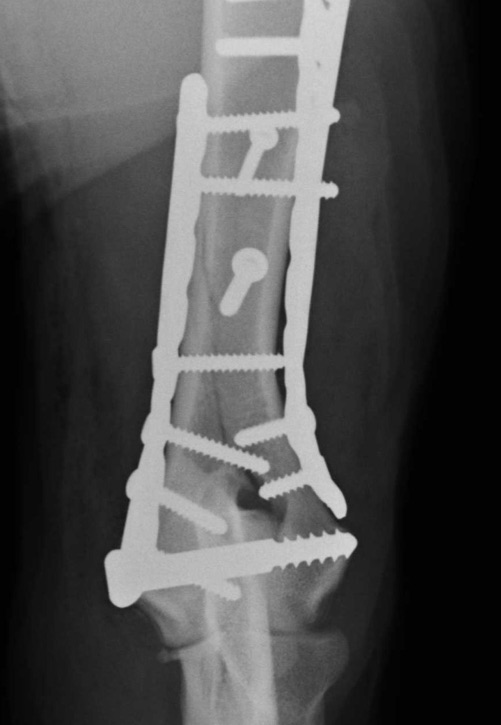How do you treat fractures and dislocations?
Broken bones and dislocated joints are common injuries in cats and dogs
Fractures (broken bones) and dislocations are common traumatic injuries in cats and dogs, just like they are with humans. Every trauma and fracture will require individualised treatment. We have a wealth of experience of dealing with such injuries, often teaching repair techniques to other vets. Whilst this can be a traumatic time for pets and their owners, rest assured that we will do everything we can to get your pet back to activity as soon as possible, and with the minimum of stress.
The Moores Orthopaedic Clinic is not set-up to manage non-orthopaedic conditions. If your pet has additional life-threatening injuries, then we will advise these are either treated prior to referral to us, or that your pet is referred to a centre set-up to manage such emergencies.

Why Moores Ortho?
We are experts in managing orthopaedic trauma, with a huge amount of experience.
At the Moores Orthopaedic Clinic we can offer:
- Highly experienced specialist surgeons
- A purpose-built modern clinic with facilities designed to minimise the risk of complications after orthopaedic surgery
- Detailed aftercare instructions and support during recovery including discounted physiotherapy packages
- Personal and professional service
- Very competitive pricing
We work closely with our neighbours, Burnside Rehabilitation, should your pet need physiotherapy and/or hydrotherapy after surgery
What can you expect before and after surgery
It will be a priority for your orthopaedic surgeon to fully understand the nature of the trauma or fracture. Depending on the type of fracture, x-rays or a CT scan are performed before making a treatment plan. Trauma can often be associated with multiple injuries, meaning these additional injuries must be recognised and managed quickly.
Most dogs will need to be strictly rested after fracture surgery. Some will need to be crate-rested. We will provide detailed and individualised postoperative care instructions. Physiotherapy and hydrotherapy may be recommended as part of the rehabilitation programme.
We will typically invite pet owners back to the clinic 6-8 weeks after surgery, to ensure their pet’s treatment is progressing as planned. Once we know the broken bone is healed, your pet can start to get back to normal activity.
Thanks to our experienced surgeons, the outlook for most fractures is very good.
FAQs
How long does a fracture take to heal in a cat or dog?
This will vary depending on the age of the patient and the nature of the fracture. In a puppy it could be as little as 2-3 weeks whereas in an adult dog with a complex fracture it may take 2-3 months or more.
Do dogs always need surgery for fractures?
Not every fracture needs surgery, but most do. If there is a viable option to avoid surgery then we will discuss this with you
How do vets treat fractures?
This is entirely dependent on the nature of the injury to your pet. Often plates and screws are used, hidden under the skin. Less commonly a temporary external frame is placed on the outside of the leg. Our surgeons are experienced in multiple techniques for managing fractures and dislocated joints. They will help your pet get back to fitness as quickly as possible.
How much does it cost to fix a dog’s fracture?
The cost will vary hugely, depending on the complexity of the injury. If we have details of your pets injury then we can provide you with a guide to costs prior to referral, and endeavour to give you a more accurate estimate once we have fully assessed your pet at the clinic.
Will my insurance cover fractures and dislocations?
Almost certainly yes, but do check your policy carefully in case there are any exclusions or limits on cover. If you are unsure about your level of cover then please let us know and we can investigate this for you.
Can a dog still walk on a fractured leg?
After surgery, we expect most trauma patients to be able to walk on their injured limb. They will need to be restricted, however, to maximise the chances of a good outcome. Every patient gets an individualised postoperative plan detailing what is and is not allowed.
Make an enquiry
Request more
information



